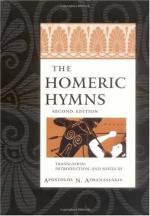So speaking, he began to fare over the wide ways of earth, Phoebus of the locks unshorn, Phoebus the Far-darter. Thereon all the Goddesses were in amaze, and all Delos blossomed with gold, as when a hilltop is heavy with woodland flowers, beholding the child of Zeus and Leto, and glad because the God had chosen her wherein to set his home, beyond mainland and isles, and loved her most at heart.
But thyself, O Prince of the Silver Bow, far-darting Apollo, didst now pass over rocky Cynthus, now wander among temples and men. Many are thy fanes and groves, and dear are all the headlands, and high peaks of lofty hills, and rivers flowing onward to the sea; but with Delos, Phoebus, art thou most delighted at heart, where the long-robed Ionians gather in thine honour, with children and shame-fast wives. Mindful of thee they delight thee with boxing, and dances, and minstrelsy in their games. Who so then encountered them at the gathering of the Ionians, would say that they are exempt from eld and death, beholding them so gracious, and would be glad at heart, looking on the men and fair-girdled women, and their much wealth, and their swift galleys. Moreover, there is this great marvel of renown imperishable, the Delian damsels, hand-maidens of the Far-darter. They, when first they have hymned Apollo, and next Leto and Artemis the Archer, then sing in memory of the men and women of old time, enchanting the tribes of mortals. And they are skilled to mimic the notes and dance music of all men, so that each would say himself were singing, so well woven is their fair chant.
But now come, be gracious, Apollo, be gracious, Artemis; and ye maidens all, farewell, but remember me even in time to come, when any of earthly men, yea, any stranger that much hath seen and much endured, comes hither and asks:
“Maidens, who is the sweetest to you of singers here conversant, and in whose song are ye most glad?”
Then do you all with one voice make answer:
“A blind man is he, and he dwells in rocky Chios; his songs will ever have the mastery, ay, in all time to come.”
But I shall bear my renown of you as far as I wander over earth to the fairest cities of men, and they will believe my report, for my word is true. But, for me, never shall I cease singing of Apollo of the Silver Bow, the Far-darter, whom fair-tressed Leto bore.
O Prince, Lycia is thine, and pleasant Maeonia, and Miletus, a winsome city by the sea, and thou, too, art the mighty lord of sea-washed Delos.




